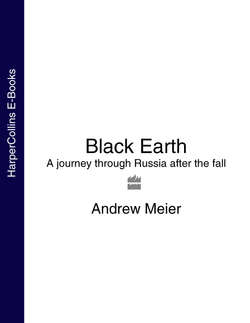Читать книгу Black Earth: A journey through Russia after the fall - Andrew Meier - Страница 13
FOUR
ОглавлениеBEYOND LUST AND FEAR, Moscow breeds power. You cannot help feeling that you are trespassing in its path. Every effort is made to impress upon the populace its privileged proximity to the unlimited power of the state. This is not just state power as in other countries. This is not merely the pomp of officialdom, but the deliberate demonstration of the state’s power over the people, an ever-present slap in their face.
It is midmorning. You walk through the cold, dank underpass, lit by long fluorescent lamps. At one end stand two grandmothers, selling cigarettes, hand-knit caps, dried flowers. The underground walkway fills with the sounds of an accordion. A mournful Russian ballad. Every day the accordion player, a Moldovan refugee, is here busking. Every day he squeezes out the same song. It is a long underpass. When at last you emerge and climb the stairs up into the cold wind of the far side of the street, you suddenly hear it: the silence. Nothing announces the power like the silence.
Kutuzovsky Prospekt may well be the broadest street in Moscow. At its widest it has seven lanes in each direction. In its center the road is divided by a lane reserved for the political and financial elite, or at least any Russian sufficiently well moneyed or well connected to procure the coveted migalka, a little flashing blue light that, once affixed to a car roof, announces the right of the faceless passenger hidden behind the curtained, smoked windows to break any traffic rule or regulation. In the morning, as the city’s bankers and bureaucrats rush toward their offices, the road is filled with cars and heavy trucks trying to tack their way into the center. The roar of the traffic, with all fifteen lanes fully loaded, is deafening. Walking the sidewalks of Kutuzovsky, as I did nearly every morning, can be unpleasant.
Until the silence comes. It happens at least twice a day, usually in midmorning and just before the sun sets. You are walking down the sidewalk, and then, in a single moment, you realize something has changed, something is amiss. All you hear is the crunch of your boots on the hard snow. On the street, the slow-moving river of cars has not simply stopped; it has disappeared. (In minutes a road as wide as a highway is completely cleared.) The trolley buses have pulled over and stand along the edge of the prospekt. The citizens too, waiting at the bus stops, stand still. Everyone waits. Hundreds of poor souls, trapped in the stilled traffic, sit mute in their parked cars. The street has frozen into a photograph, and you are the only one moving through it.
For several minutes nothing stirs. Then suddenly a black Volga, an illuminated migalka fixed to its roof, speeds down the middle of the prospekt. Then another, and a third, a fourth. And then the chorus of sirens accompanying the flashing lights. A convoy of automobiles, a dozen in all, each duly impressing the motionless citizenry with its size, speed, and cleanliness. As men, women, and schoolchildren (and the secret policemen in plain clothes sprinkled among them) stand and watch, a squadron of BMW militsiya sedans sweeps past, followed by an extended black Mercedes limousine and a quartet of oversize Mercedes jeeps. As the convoy passes, the cars leave a ripple of turned faces on the sidewalks.
A visitor might imagine the world had stopped because of a dire emergency. But the Muscovites frozen in place along this vast slate gray avenue recognize the scene for what it is: their president, the leader of all Russia, making his way to work. More than twenty miles of roadway in the Russian capital are closed in this fashion every day. In a city already paralyzed by too much snow and too many cars. And still no one complains, ever. It is the essence of power, Moscow style. It is naglost. In general, naglost is an unseemly blend of arrogance, shamelessness, and rudeness. In this instance it is the contemptuous disdain of the rights of ordinary Russians.
